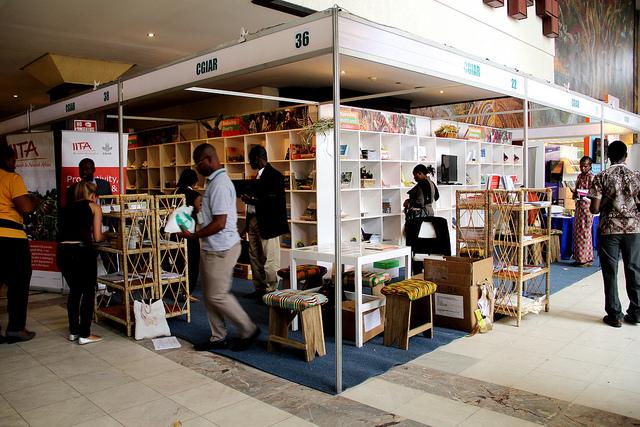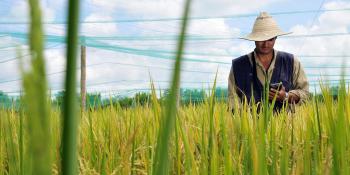Round-up: What we did at Africa Agriculture Science Week

CCAFS achievements during Africa Agriculture Science Week:
- 70 people participated in CCAFS side event on Climate-Smart Villages.
- 8 original stories or media interviews incl. BBC Focus on Africa, Voice of America in French, and Radio France International.
- Opionion pieces picked up by media: Robert Zougmoré's piece in Jeune Afrique;
Bruce Campbell on Climate-proofing Africa's lifeline – Water in Huffington Post. - 19 original blog stories published, incl. analysis of key conference sessions, and reports back from side events.
- During the conference period, @cgiarclimate sent 260 Tweets to 8,854 followers, creating 3,000,000 million potential impressions.
- 14 percent increase in web traffic.
In July of this year, members of the CGIAR Research Program on Climate Change, Agriculture and Food Security (CCAFS) travelled to Ghana to participate in the Africa Agriculture Science Week (AASW). For one whole week researchers, policy makers and farmer representatives joined in to find solutions and share experiences on how Africa can start feeding Africa.
Here is a round-up of our activities, tweets, blog stories and photos.
The week began with the launch of a new report by the International Water Management Institute (IWMI) about climate change in West Africa’s Volta river basin, and the implications for farming and food security in the region. The story, which also highlighted innovative approaches for enhancing resilience, such as improving groundwater supplies available to rural areas by “recharging” local aquifers with water taken from rivers or reservoirs, was picked up by many media outlets in Ghana and in the region and was featured on BBC Focus on Africa and Radio France International.
In Ghana, farmers struggle on a daily basis to make ends meet, battling an infertile soil and sometimes inhumane heat. Before the conference, Caity Peterson, CCAFS visiting researcher and writer traveled to Ghana’s rural northern region to learn more about farmers’ conditions, and potential obstacles to adapt to climate change and implement climate-smart agricultural activities. One visible obstacle to this is gender inequality. For example, women’s lower ability to receive information about climate change prevents them from trying new climate-smart technologies. We agree:
Give special attention to the entrepreneurial role of #Africa's #agricultural women. #AASW6 @DrIbrahimMayaki @ILRI http://t.co/bo0pg8J6lS
— Susan MacMillan (@SusanMacMillan) July 23, 2013
The conference kicked off with a CCAFS-convened side event ‘Climate-Smart Villages in Africa - opportunities for farmers and communities’. The event shared insights from the ‘Climate-Smart Village’ model being implemented in research sites in East Africa, West Africa and South Asia. ‘What are Climate-Smart Villages?’ is a good introduction to the long-term development model that is coming into place. CCAFS East Africa researcher John Recha explained in an interview how important partnerships are in making these projects successes. In lower Nyando Kenya, John and his colleagues are working on providing farmers alternative livelihoods to increase their climate resilience. Experience shows that beekeeping has a lot of potential to help women farmers manage climate risks.
During the event, our researchers explained the ongoing village activities, where farmers are for example taught how climate forecasts can be used for effective farm-decisions. On the sites, researchers, development practitioners and farmers work closely together in finding the right climate-smart tools and techniques that work for that area. However CCAFS also works to influence the international and national policy agenda based on research results. The ambition is to ensure that agriculture and climate change issues are reflected in adaptation and mitigation plans as well as international negotiation agreements.
The impressive CGIAR booth brought together research from all Centers and Research programs, and served as a focal point for participants to pick-up the latest agricultural research and results. Networking and learning were top activities going on at the booth all throughout the week.

CGIAR Booth at ghana conference. Photo: MiuruJ
View more photos of keynote speakers, Networking at the booth and our side event.
We learned a lot from various other side events convened by our partners. CCAFS Head of Research Dr Sonja Vermeulen gave a comprehensive presentation on how Africa can take the lead on implementing and scaling-up climate-smart agricultural projects. This was done at the ‘Climate-Smart Agriculture’ side event convened by CGIAR’s close partner and conference organizer, the Forum for Agricultural Research in Africa (FARA). At the CGIAR Challenge Program on Water and Food (CPWF) event, moderator Lindiwe Sibanda declared that "science without the bottom-up process for engagement will not change Africa" which sparked engagement online:
"@FARAinfo: Blog clip: Science without engagement will not change Africa (CPWF) http://t.co/Yh33N4jrXz #AASW6"
— Aine (@Ruthaine) July 23, 2013
Researchers and partners from the International Livestock Research Institute (ILRI), discussed the importance of livestock research for Africa’s future food security. At an event hosted by ">the International Centre of Insect Physiology and Ecology (ICIPE), we learned about the interesting role insects play, both as nutritious food, and in generating food products such as honey.
Another area in Ghana where inequality prevents regions to become food and nutrient secure are on cocoa plantations. Here women normally don’t have ownership over the production, limiting their ability to earn an income and provide nutritious food for their children, discussed at the World Agroforestry Centre side event.
Keynote speakers delivered passionate and engaging speeches on the path to
ensuring Africa could in fact feed itself. Kanayo Nwanze, President of the International Fund for Agricultural Development (IFAD) told the General Assembly that there are huge, untapped opportunities on the continent, to improve food production and become self sufficient, like in the good old days but there is still a long road ahead for this to become a reality. Making agriculture attractive to youth is one key goal we must achieve in order for Africa to be food secure in the future, he emphasized. Together with Kanayo, we have hope for Africa's future:
#Africa can feed Africa. Africa should feed Africa and Africa one day will feed Africa, says #ifad Prez @knwanze #aasw6
— IFAD (@IFADnews) July 18, 2013
CGIAR CEO Frank Rijsberman emphasized CGIAR’s commitment to help Africa feed Africa, but strong and effective partnerships are key in pushing Africa into a new food secure future.
RT @ciat_: @FrankRijsberman says "@CGIAR is ready to respond to Africa’s needs and invest in effective partnerships" #AASW6
— CGIAR Consortium (@CGIAR) July 19, 2013
The conference ending words and recurrent theme was, and still is for us:
"@IFADnews: Smallholder farmers can feed the world and they are key to achieving food security http://t.co/7JVohsBST1 #aasw6 #agriculture"
— Future of Food (@MPULEinstitute) July 21, 2013



